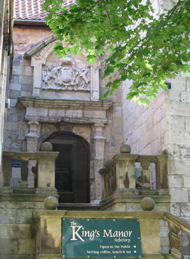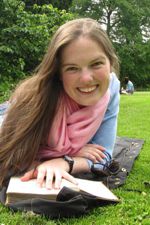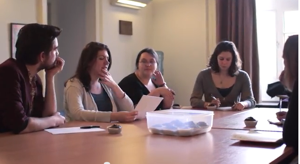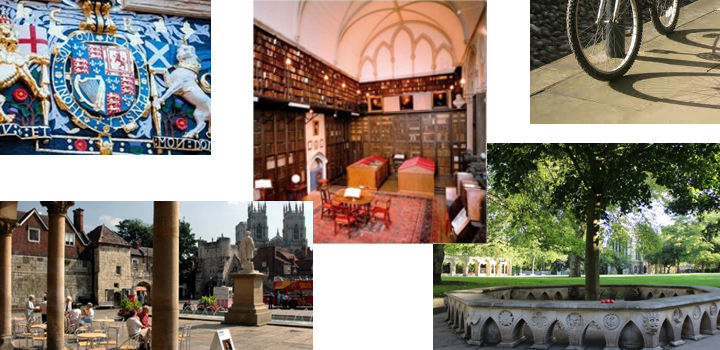A Day in the Life of a CECS Student
Kaylee Peelen 30 May 2014

The King’s Manor, hub of the Centre for Eighteenth Century Studies (CECS) at the University of York, is an inspirational setting for any student fortunate enough to work in its rooms. I never grow tired of passing under the brilliantly painted coat of arms on a gorgeous sunny morning to enter a courtyard where monks and courtiers used to bustle centuries ago. I climb the stone steps to the former chamber of the medieval Council of the North, which is now a refectory providing caffeine and comfortable chat to students who need a study break. Tea and a sausage roll are just what I need to start my day.
To reach the CECS workroom, I navigate a labyrinth of staircases and squeaky doors, but once I arrive, I may as well be the only person in the building. All I can hear as I spread my papers on the table and turn on the computer is the cooing of pigeons on the roof and the chiming of the York Minster bells as they strike the hour.

I would spend more time reading the excerpts for my morning seminar, but I need a book from the King’s Manor library. As I pace the long wing, I step softly on the creaking floorboards so I don’t disturb students studying in the nooks by the tall windows. I pause a moment to admire the view of the city walls and Exhibition Square through the diamond-paned glass and impulsively wave at a group of tourists passing below. To my surprise, they wave back.
I quickly locate the book I need and have just enough time to scribble some notes before my seminar begins. As I enter the spacious room with the bricked-in fireplace and uneven, black-timbered ceiling, my classmates greet me with banter about the inaccessibility of secondary sources and warm inquiries about the weekend. When the tutor arrives, we dive into our two-hour discussion.

All of us enjoyed this week’s texts so the observations are articulate and enthusiastic. Since this is an interdisciplinary course, each of us approaches the topic through the lens of our individual disciplines and period interests. Through the points brought up by my peers, my perspective adjusts and key ideas stand out in bold relief. Conversation for mutual improvement is not only a theme in the texts before us: it is our mode of academic life.
After the seminar lets out, I pop into my favourite café for a latte and saunter across the street to the Minster library in the park behind the cathedral. In the reading room, an antique book waits for me on a soft felt cushion with the delicate, yellowed pages held back by a lead-weighted cord. Marveling at the privilege of handling such a beautiful primary text, I settle comfortably into my seat.

Much too soon, I must leave the book and cycle to the university’s main campus for a guest lecture at the Humanities Research Centre, a curvilinear building designed exclusively for humanities postgraduates as the hub for their academic and social life. I stop for a quick chat with some friends before I slip into my seat in the cosy auditorium. Afterwards, I find a free desk in the quiet study area and vaguely regret that it isn’t Thursday, when there would be cake in the lobby lovingly baked by my fellow postgrads.
I hop on my bike to return to the King’s Manor for the CECS Postgraduate Forum. Chaired and organised by students within the department, this low-pressure environment allows postgraduates to experiment with new ideas and gain experience in presenting an academic paper. A friend of mine is speaking today, so I come up with a tricky question that will show off how well he knows his topic.
In the evening, department postgraduates and faculty gather for the weekly CECS research seminar. I always find interesting tidbits in an expert’s knowledge of areas I haven’t studied myself, even if the subject is outside my research interests. Besides, the seminar provides an intimate opportunity to network with academics from outside the university. I look forward to introducing myself to this evening’s speaker as we congregate in the Lamb and Lion Inn for our traditional after-lecture pub evening.
As I chat with one of my tutors across the table, I marvel that I can interact with professors who are both rigorously professional and personally supportive. Publications by the CECS faculty fill my bookshelves, but I’m consistently encouraged to pursue an original line of inquiry, especially if it’s something I’m passionate about. Every tutor in the department genuinely cares about the students he or she works with and welcomes them into the academic community of conferences, publicity, recruitment, and scholarship.
I finish my drink and head home through the dim and empty streets of York. The Minster rises beside me, its massy Gothic spires almost blocking out the stars and its soft beige stone glowing in the exterior lights. After the tourists have left and the shopkeepers have closed up for the day, I imagine the ghosts of the Romans, Vikings, Anglo-Saxons, and yes, the Georgians, rising from the ruins under the flagstones. I chose to study in York for the city’s sake as much as for the Centre for Eighteenth Century Studies. Neither has yet to disappoint.
